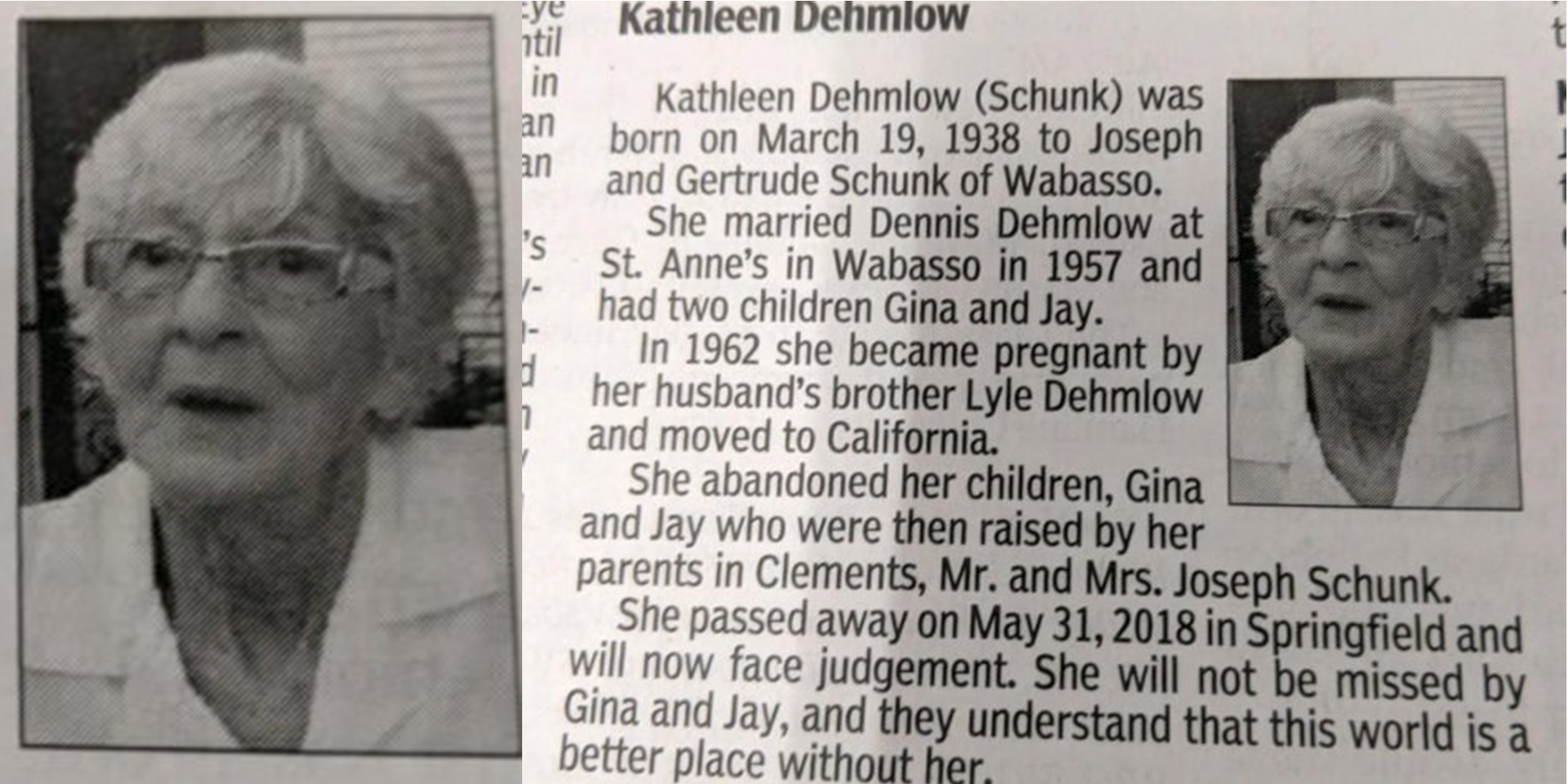Is it worth writing a vengeful obituary about someone you hated? As this week proved, some definitely think so
The old adage to never speak ill of the dead seems redundant these days – and I'd be the first to admit that sometimes we speak far too well of them. I thought as much at my own grandmother's funeral


Sitting in the pew at my grandmother’s funeral, I remember feeling slightly confused. The priest was midway through the eulogy and it had begun to dawn on me that perhaps my entire family had come to the wrong church.
Who was this woman who loved nothing more than a sing-song round the piano and delighted in being able to gather her nearest and dearest together for raucous parties? The woman I remembered had found her greatest delights only in a thorough armchair critique of everyone else’s behaviour and the dirty bits of the latest Mills & Boon. I had never seen her so much as hum a catchy jingle and other people’s happiness seemed to bring her no joy whatsoever.
This paragon of family virtue bore no resemblance whatsoever to the woman I had grown up with, and I think had my grandmother heard it before her death she wouldn’t have stood for it either. But something strange happens to us when someone we love dies: the deceased is instantly martyred, no matter what their behaviour in life was actually like.
Except, this week, in the case of Kathleen Dehmlow.
In case you missed the social media sensation that was Dehmlow’s obituary, let me recreate it for you here. It starts in a traditional manner, highlighting Dehmlow’s birth and early life in Minnesota in the US, followed by her marriage and the arrival of two children, Jay and Gina.
And then the tone starts to change. Seemingly out of nowhere, the obituary lists the affair she had with her brother-in-law and her subsequent abandonment of her family to go and live with him, and the child they’d conceived in California. So far, so not exactly the Brady Bunch. The final paragraph truly twists the knife: “She passed away on May 31, 2018, in Springfield and will now face judgment. She will not be missed by Gina and Jay, and they understand that this world is a better place without her.”
The obituary was placed by Dehmlow’s two children from her first marriage, who despite being in their 50s have clearly never been able to forgive their mother for leaving them. After the obituary went viral, Jay gave several interviews reiterating the sentiments and declaring how pleased he was to have published it. But can publicly shaming your dead mother, I wonder, ever actually heal the wounds of a difficult childhood?
The daughter of Marianne Theresa Johnson-Reddick clearly thought so. Back in 2014, she published an obituary of her mother claiming she had abused all her children and “stalked and tortured anyone they dared to love”. When asked about it, Katherine Reddick said she found writing the obituary “healing”, that it gave her a sense of control over an out-of-control childhood. This echoes Jay Dehmlow’s belief that writing his mother’s obituary finally allowed him to “have the last word”. It seems that even when death tries to take the argument away from us, we just can’t quite let it go.
Both Dehmlow and Reddick’s cases are extreme but there are other great examples of an obituary having the last word, particularly when they are written by their subject. Engineer Val Peterson used his last days on earth to write a full confession, published after his death. Among the things Peterson felt he ought to own up to was the fact that the PhD he’d used throughout his career had been granted to him in an administrative error; that he once stole a safe from a motel; and that he’d been banned from both Disneyland and SeaWorld.
Louis Casimir threw his friends under the bus in his own obituary, claiming that those who hadn’t died before him had become “petty criminals, prostitutes and/or Republicans”. And retired teacher Emily Philip’s obituary famously reminded us all to appreciate the time we have: “I was born; I blinked; and it was over.”
The old adage to never speak ill of the dead seems redundant in a time when we merrily carry out Twitter spats in front of the entire internet and post semi-naked selfies for anyone with an Instagram account to see. We live our entire lives in such public view that it seems useless to hide our family spats, disappointments and anger under the carpet.
And yet death doesn’t feel like the place for self-righteous indignation. The argument is done; there will never be an apology or a reckoning; the subject of our anger is too far gone for public shaming to ever hurt them.
Or are they? As I wrote that opening paragraph about my grandmother’s funeral, I felt a small prickle at the back of my neck, a sense that somewhere my grandmother was watching me and making a mental note that I’d used her love of a Mills & Boon novel to gently mock her. Just a small reminder to herself that, should we ever meet again, she would want to settle back into her armchair and begin a long tirade on the sort of people who mock their elders and betters.
It might feel like an obituary is the final word but, in case it’s not, why would you ever risk an eternity of family rows?
Join our commenting forum
Join thought-provoking conversations, follow other Independent readers and see their replies
Comments
Bookmark popover
Removed from bookmarks